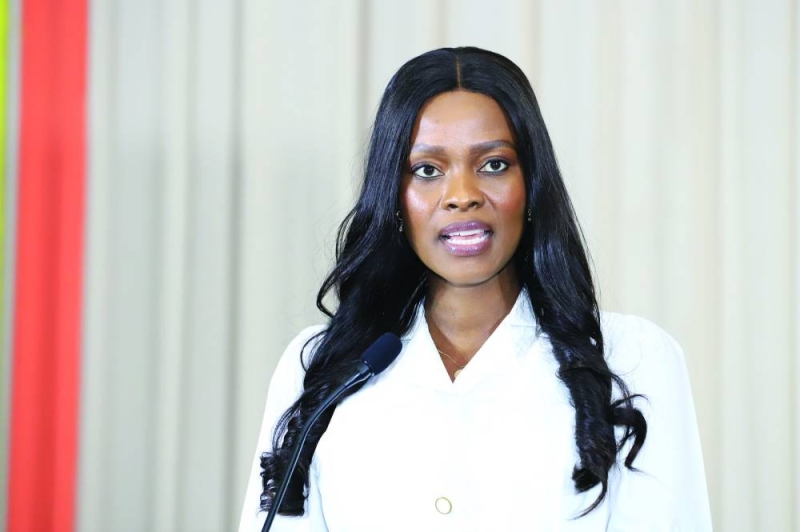GBV isn't someone else's problem but ours — Mophuting
Nnasaretha Kgamanyane | Wednesday May 7, 2025 06:00


Speaking at the Brunch with Dorcus Oboetswe on the Fight Against GBV event on Saturday at Avani, Mophuting said GBV doesn’t discriminate as it cuts across class, age, geography and even language.
The junior minister explained that as a woman, a mother, a sister, and a Motswana she carried with her both the burden of the nation’s sorrow and the burning hope that they could and must do better in the fight against GBV. ' It is through such grassroots-driven engagements that awareness is deepened, stigma is challenged and real solutions begin to take shape. I am heartened to see the vibrant presence of various stakeholders here today from government, civil society, the private sector, and our communities,' she said.
'This is a testament to the growing resolve to unite in protecting victims, empowering survivors, and dismantling systems that perpetuate violence. Gender-based violence isn't merely a women’s issue; it is a national emergency. It reflects the dangerous mix of cultural silence, skewed power dynamics, and inadequate institutional responses. For too long, we have looked away or rationalised.'
She further pointed out that for too long, systems meant to protect have instead retraumatised victims. She said the time for reflection was over as it was now call for action.
Speaking about the day's theme, 'Creating Conducive Spaces to Confront Toxic Notions of Masculinity', Mophuting said it challenged them to examine the environments they nurtured in their homes, schools, boardrooms, and even in their WhatsApp groups. She added that they had to ask if they were reinforcing harmful stereotypes or dismantling them.
Mophuting asked if they were grooming their boys to equate manhood with power or with empathy and respect. Furthermore, she challenged every Human Resource department represented at the event to build internal policies that protect, educate and uplift. She urged them to train staff to recognise signs of abuse and trauma.
She added that they must create reporting systems that are safe and survivor-centred. She pleaded with them to let the workplace become part of the healing, not the hiding.
From the Office of the President, she committed to ensuring that GBV remained at the top of the national agenda.
Mophuting said that included pushing for stronger inter-ministerial coordination, improved survivor referral systems and dedicated funding for shelters and psychosocial support programmes. 'We will ensure that economic empowerment opportunities reach survivors, so they aren't forced to return to abusers out of financial desperation. We will also invest in the education of boys and young men, because prevention is more sustainable than intervention.
'And most importantly, we won't let this conversation end with applause,' she said. Mophuting also called on leaders, artists, influencers, mothers, brothers, and fathers to stop treating GBV as a statistic. She stated that behind every number was a face, a life, and a story that should never have been cut short or silenced. She highlighted the December 2024 figures: 60 rapes, 19 murders, and 13 cases of child defilement.
'These aren't just data points. They are ruptured lives. They are our neighbours, our nieces, our children. Let's rise not in isolation, but in unity. Let this brunch nourish more than our bodies; let it ignite a fire in our spirits. Let's be remembered not for our titles but for the courage we showed when Botswana needed us most,' she said.
'We won't wait for another name to trend, another protest to erupt, another daughter to disappear. We act now. We act boldly. And we act together. Let's not walk away from this event the same way we came in. Let's leave with a shared resolve, that in our time, GBV won't just be reduced. It will be rejected, rooted out, and remembered as something our generation refused to tolerate.'
Furthermore, the host, the specially elected councillor for Gaborone South, Oboetswe, said she created the Dorcus Oboetswe Foundation to focus on fighting against GBV.
Even though she stated that she was also a GBV victim, she couldn't go into detail about her ordeal but said it was disheartening that every day when they wake up there would be stories of women (men) killed by their intimate partners and of women (men) killing children.
She said it was high time the fight against GBV was strengthened by establishing from the root and finding ways to prevent it.
She urged GBV victims to speak up and seek help whilst on the other hand she called on perpetrators to also seek help when they realise that they have a problem that leads them to abusing their partners.
'I want us to stand in unity and fight against GBV. It is time for all us to stop GBV. We don't want to read from newspapers that a man killed a woman and vice versa. Let's unite and end GBV. We no longer want stories where stepmothers (stepfathers) abuse their stepchildren.
'There is need for new policies that protect victims. We don't want cases where we see perpetrators walking freely out there when their victims live in fear,' she said.
